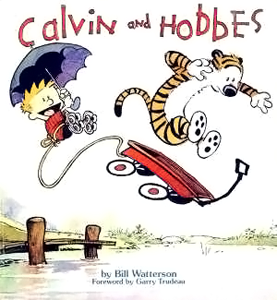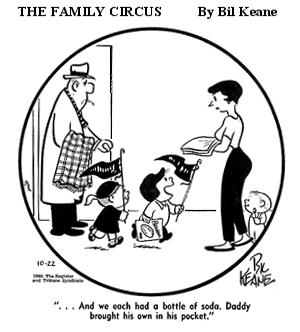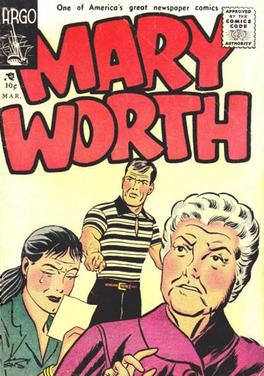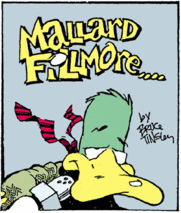
A comic strip is a sequence of cartoons, arranged in interrelated panels to display brief humor or form a narrative, often serialized, with text in balloons and captions. Traditionally, throughout the 20th and into the 21st century, these have been published in newspapers and magazines, with daily horizontal strips printed in black-and-white in newspapers, while Sunday papers offered longer sequences in special color comics sections. With the advent of the internet, online comic strips began to appear as webcomics.

Calvin and Hobbes is a daily American comic strip created by cartoonist Bill Watterson that was syndicated from November 18, 1985, to December 31, 1995. Commonly cited as "the last great newspaper comic", Calvin and Hobbes has enjoyed broad and enduring popularity, influence, and academic and philosophical interest.

Dilbert is an American comic strip written and illustrated by Scott Adams, first published on April 16, 1989. It is known for its satirical office humor about a white-collar, micromanaged office with engineer Dilbert as the title character. It has led to dozens of books, an animated television series, a video game, and hundreds of themed merchandise items. Dilbert Future and The Joy of Work are among the most read books in the series. In 1997, Adams received the National Cartoonists Society Reuben Award and the Newspaper Comic Strip Award for his work. Dilbert appears online and as of 2013 was published daily in 2,000 newspapers in 65 countries and 25 languages.

Peanuts is a syndicated daily and Sunday American comic strip written and illustrated by Charles M. Schulz. The strip's original run extended from 1950 to 2000, continuing in reruns afterward. Peanuts is among the most popular and influential in the history of comic strips, with 17,897 strips published in all, making it "arguably the longest story ever told by one human being". At the time of Schulz's death in 2000, Peanuts ran in over 2,600 newspapers, with a readership of around 355 million in 75 countries, and was translated into 21 languages. It helped to cement the four-panel gag strip as the standard in the United States, and together with its merchandise earned Schulz more than $1 billion.

Monty is an American comic strip created, written and illustrated by cartoonist Jim Meddick. The strip began as Robotman starting February 18, 1985. The title changed to Monty in 2001.

The Far Side is a single-panel comic created by Gary Larson and syndicated by Chronicle Features and then Universal Press Syndicate, which ran from December 31, 1979, to January 1, 1995. Its surrealistic humor is often based on uncomfortable social situations, improbable events, an anthropomorphic view of the world, logical fallacies, impending bizarre disasters, references to proverbs, or the search for meaning in life. Larson's frequent use of animals and nature in the comic is popularly attributed to his background in biology. The Far Side was ultimately carried by more than 1,900 daily newspapers, translated into 17 languages, and collected into calendars, greeting cards, and 23 compilation books, and reruns are still carried in many newspapers. After a 25-year hiatus, in July 2020 Larson began drawing new Far Side strips offered through the comic's official website.
Tom the Dancing Bug is a weekly satirical comic strip by cartoonist and political commentator Ruben Bolling that covers mostly US current events from a liberal point of view. Tom the Dancing Bug won the 2002, 2003, 2007, 2008, and 2009 Association of Alternative Newsweeklies Awards for Best Cartoon. The strip was awarded the 2010 Sigma Delta Chi Award for editorial cartooning by the Society of Professional Journalists and best cartoon in the 2018 Robert F. Kennedy Book & Journalism Awards. His work on the strip won Bolling the 2017 Herblock Prize and the 2021 Berryman Award for Editorial Cartoons, and he was a finalist in the Editorial Cartooning category for the 2019 and 2021 Pulitzer Prize.

The Family Circus is a syndicated comic strip created by cartoonist Bil Keane and, since Keane's death in 2011, is written, inked and rendered (colored) by his son Jeff Keane. The strip generally uses a single captioned panel with a round border, hence the original name of the series, which was changed following objections from the magazine Family Circle. The series debuted on February 29, 1960 and has been in continuous production ever since. According to publisher King Features Syndicate, it is the most widely syndicated cartoon panel in the world, appearing in 1,500 newspapers. Compilations of Family Circus comic strips have sold more than 13 million copies worldwide.

Pearls Before Swine is an American comic strip written and illustrated by Stephan Pastis. The series began on December 31, 2001. It chronicles the daily lives of an ensemble cast of suburban anthropomorphic animals: Pig, Rat, Zebra, Goat, and a fraternity of crocodiles, as well as a number of supporting characters, one of whom is Pastis himself. Each character represents an aspect of Pastis's personality and worldview. The daily and Sunday comic strip is distributed by Andrews McMeel Syndication.

Mary Worth is an American newspaper comic strip that has had an eight-decade run from 1938. Distributed by King Features Syndicate, this soap opera-style strip influenced several that followed. It was created by writer Allen Saunders and artist Dale Connor, initially appeared under the pseudonym "Dale Allen". Ken Ernst succeeded Connor as artist in 1942.
Funky Winkerbean was an American comic strip by Tom Batiuk. Distributed by North America Syndicate, a division of King Features Syndicate, it appeared in more than 400 newspapers worldwide.

Mallard Fillmore is a comic strip written and illustrated by Bruce Tinsley until 2019 and Loren Fishman since 2020. It has been syndicated by King Features Syndicate since June 6, 1994. The strip follows the exploits of its title character, an anthropomorphic green-plumaged duck who works as a politically conservative reporter at fictional television station WFDR in Washington, D.C. Mallard's name is a pun on the name of the 13th president of the United States, Millard Fillmore.

Arlo and Janis is an American gag-a-day comic strip written and drawn by Jimmy Johnson. It is a leisurely paced domestic situation comedy. It was first published in newspapers on July 29, 1985.

Brad Guigar is an American cartoonist who is best known for his daily webcomic Greystone Inn and its sequel Evil Inc.
Wondermark is a webcomic created by David Malki which was syndicated to Flak Magazine and appeared in The Onion's print edition from 2006 to 2008. It features 19th-century illustrations that have been recontextualized to create humorous juxtapositions. It takes the horizontal four-panel shape of a newspaper strip, although the number of panels varies from one to six or more. It is updated intermittently.
Liō is a daily comic strip created by American artist Mark Tatulli and distributed by Universal Press Syndicate/Universal Uclick/Andrews McMeel Syndication since May 15, 2006. As a pantomime strip, it has an international appeal. In 2008, the strip brought Tatulli a National Cartoonists Society Newspaper Comic Strip Award.

You Can with Beakman and Jax, also known in its Spanish-language version as El Mundo de Beakman, is an American science and education syndicated comic strip by Jok Church, which ran from July 14, 1991 to July 17, 2016. The comic strip, and associated television series, featured facts about science and languages.
Bleeker: The Rechargeable Dog is a comic strip by Jonathan Mahood about ten-year-old Skip Smalls, his friend Lila, and Bleeker, his electronic dog. The strip is distributed by King Features Syndicate.

Allen Saunders was an American writer, journalist and cartoonist who wrote the comic strips Steve Roper and Mike Nomad, Mary Worth and Kerry Drake.
Cul de Sac is an American comic strip created by Richard Thompson. It was distributed by Universal Press Syndicate/Universal Uclick to 150 worldwide newspapers from 2004 to 2012.













